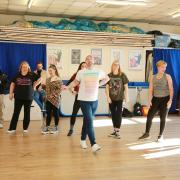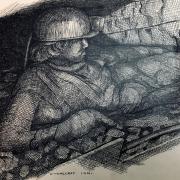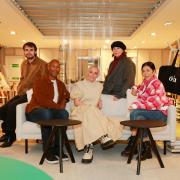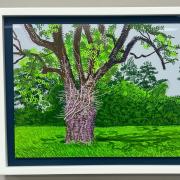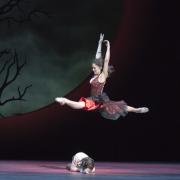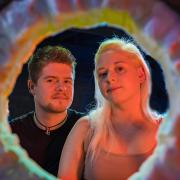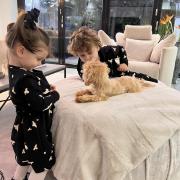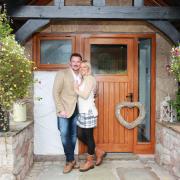Jue Snell developed sepsis after being electrocuted by her laptop. After taking the brave decision for her arm to be amputated, she is now using her experience to empower and embolden and is walking the catwalk at London Fashion Week

Jue Snell knows all about adversity. She knows what it's like to feel stripped bare and tested to the very core. She can also testify, from harrowing personal experience, how it feels to be completely transformed by the very situation that threatened to break her.
The married mother-of-two from Lach Dennis had life-saving surgery to amputate half of her arm after she was electrocuted whilst plugging in her laptop.
She had a successful career in business transformation and performance management, but everything changed when her hand became stuck to a faulty plug socket giving her a sustained, severe electric shock through her body.
'It's actually not what you'd expect - it's not like you see on TV where their hair stands on end,' she lightheartedly points out, despite the obvious horror. 'I was conscious the whole time and the current felt like pins and needles - it travelled all the way up my arm, into my face and across my chest. I vividly remember trying to pull my hand away, but I couldn't get it off the socket.'

Uncontrollable sickness followed as her body's fight or flight response kicked in: 'I had really bad chest pains and paramedics thought I was going to have a heart attack,' she explains. 'Apparently when you get an electric shock it can either affect your nervous system or your heart - after many tests doctors at the hospital said I had no damage to my heart and I was extremely lucky to be alive.
'One of the fingers on my right hand had a puncture mark, which was the exit point where the current had actually left my body. Medics were concerned about my left hand. They told me to go home, rest and elevate my arm. The worst thing, at that point, was I was still constantly being sick from both the physical and mental shock. The following weeks were agony, I constantly felt like my arm was soaking in boiling hot oil, and when it was exposed to the cold, it was like it was in shattered glass.'
It turns out Jue was suffering from Complex Regional Pain Syndrome (CRPS) - a very aggressive, relentless and highest-ranking pain condition. After 12 months of unrelenting pain, operations, procedures and therapies that led to her being bed-bound in hospital three-to-four times a week, she developed sepsis. She immediately agreed to amputation of her arm below the elbow.
'I didn't hesitate,' she says, in her gentle but matter-of-fact manner. 'I was ready. The pain was so bad, it was affecting my life so much. I couldn't function on the medication and the pain was indescribable.'

But although the decision to amputate came quickly in the end for Jue, the realisation of the impact on her husband, children and other loved ones hit home. 'I went into overdrive to prepare and protect them; my little one was still in nursery, so I started looking for positive ways I could prepare her for my operation.
'We discovered the Amputeddy books and we started watching Cerrie Burnell on CBeebies, as she has a stump similar to what I was going to have. I got a happy picture of me on holiday and photoshopped a stump onto my arm so she didn't get a shock when I came home from hospital.'
Whilst her youngest daughter, Ella-Boo, three, coped well, she wasn't prepared for her almost teenage daughter's response: 'Hollie didn't want to hug me. It was heartbreaking as I was still me, but it was totally understandable. It's such a tough age and she was worried about what people were going to say about me. Six months later she told me she couldn't believe she'd reacted that way but I told her, upset as I was, I completely understood. What 12-year-old kid wants to be put in any category that makes them different?'
Post-amputation, Jue embarked on a four-year journey to heal, starting with learning how to manage with the loss of her hand - simple, practical things like putting bobbles in hair, opening jars. Then came the trauma response.
'I developed an eating disorder,' she says. It was a reaction to looking different - a thought process of 'if my arm is going to look like this then the rest of me has to be perfect' kind of thing. She lost her driving license due to dissociation fits, where the body/mind is so overwhelmed it shuts off. PTSD, anxiety and depression became familiar terms as she underwent intensive therapy and it was during one of her lowest points that she came to a realisation.
'I've never been the kind of person to feel like a victim, why would I now?' she asked herself. 'I've survived, I've got a chance, I needed to sort myself out and make this a positive thing. Paralympians were so inspirational to me, but I knew I was never going to be that so where was I going to put my focus?
'I put focus on healing. I stripped it all back, took control bit by bit. I started a blog on Instagram, talking about the experience, my feelings - good and bad. I connected with people and used what I had been through to help them. I started training at the gym and blogging about how to do that with one arm. Everything started to make so much sense.'
Five years on and life looks a whole lot different. Jue is now the 2020 calendar cover girl for Models of Diversity - an agency that specialises in disabled models. She's established a successful brand and career as a motivational speaker and coach, launched her own empowering clothing line for adults and children, and she visits universities, businesses, schools, medical bodies and charities to discuss being an amputee. She also helps companies with supporting mental health, occupational health and employee engagement. And she recently took to the catwalk in London Fashion Week. In a word, she is formidable.
'I know now this was actually the best thing that could have happened to me,' she says with complete conviction. 'Despite being so difficult, it's given me the biggest opportunity to learn. I understand how the mind works under trauma or duress, how it cannot only impact your mental health, but your physical health too.
'Even though this has happened to me, I have chosen a path to embrace it and allow it to help others to know anything can be achieved. I'm showing people, women - anyone - that they do not need to fit into a perfect box. When I was younger I wanted to fit into what I thought I was supposed to look like - now I don't. Many children and young adults struggle with their idea of perfection and I want to teach them it's about being real and being honest, it's about who you really are.
'I know this is who I really am. It's so liberating and empowering - it's a mindset thing for anyone. And for people with disabilities, equally, once they are in the right mind set, they can do anything just the same. We have equal rights no matter what has happened to us.'
She's quick to pay tribute to her girls, now 17 and eight, and her husband, Mike: 'They've been amazing and of course it's a journey. You don't 'fix' this, you manage it and move through it. It has affected everyone and of course it's had a huge impact on our marriage, but it's so strong as a result. It's the best it's ever been. We're not in a bubble, we're normal and at times, when we get irritated, our motto is simple: life's too short.'
The Models of Diversity calendar, featuring Jue on the cover, can be purchased from modelsofdiversity.org




